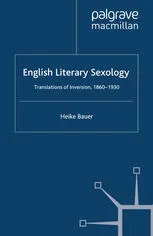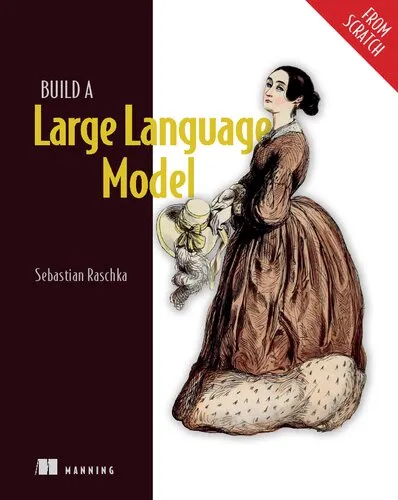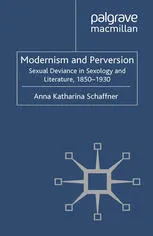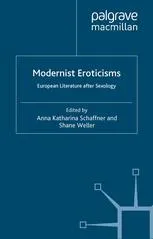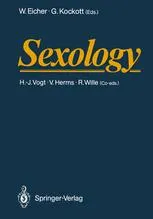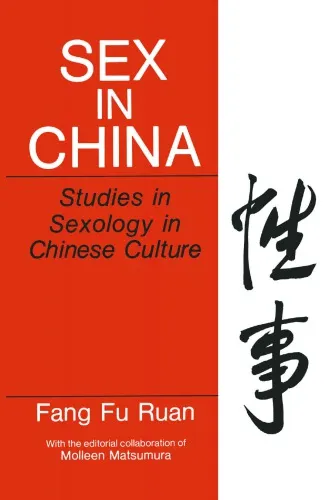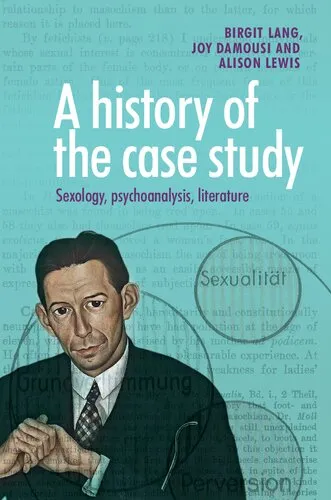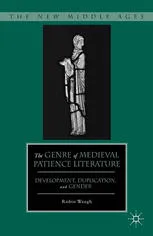English Literary Sexology: Translations of Inversion, 1860–1930
4.0
بر اساس نظر کاربران

شما میتونید سوالاتتون در باره کتاب رو از هوش مصنوعیش بعد از ورود بپرسید
هر دانلود یا پرسش از هوش مصنوعی 2 امتیاز لازم دارد، برای بدست آوردن امتیاز رایگان، به صفحه ی راهنمای امتیازات سر بزنید و یک سری کار ارزشمند انجام بدینکتاب های مرتبط:
معرفی کتاب: English Literary Sexology: Translations of Inversion, 1860–1930
کتاب English Literary Sexology: Translations of Inversion, 1860–1930 نوشته هیکه باور (Heike Bauer) یک اثر پژوهشی برجسته و منحصربهفرد است که به بررسی تأثیر مفاهیم علمی و فرهنگی مرتبط با "inversion" یا همان واژگونی جنسی در ادبیات انگلیسی میپردازد. در این کتاب، نویسنده تلاش کرده است رابطه متقابل میان گفتمانهای علمی و ادبی را از اواخر قرن نوزدهم تا اوایل قرن بیستم تجزیه و تحلیل کند. این مطالعه انواع ترجمههای مفهومی و کاربردهای فرهنگی مربوط به هویت جنسی و جنسیتی را بررسی کرده و تأثیر آنها را بر چارچوبهای فرهنگی و هنجارهای اجتماعی بررسی میکند.
خلاصه مفصل کتاب
کتاب English Literary Sexology مطالعهای میانرشتهای است که مرزهای میان ادبیات، مطالعات جنسیت و تاریخ علم را پشت سر میگذارد. این کتاب بر مفهوم "inversion" متمرکز شده است که در قرن نوزدهم بهعنوان اصطلاحی علمی برای توصیف الگوهای هویتی که از هنجارهای تعریفشده زنانه و مردانه منحرف میشدند، مطرح شد. هیکه باور نقش نویسندگان ادبیات انگلیسی در ترجمه این مفاهیم علمی به فرهنگ عامه و تأثیر متقابل این گفتمان بر نوشتارهای علمی را بررسی کرده است.
بخشهای مختلف کتاب به مطالعه آثار نویسندگانی چون اسکار وایلد، ردفیلد و پالمن اختصاص دارد. در این متون، باور نشان میدهد که چگونه ادبیات دریچهای برای ارائه ایدهآلها و در عین حال، به چالش کشیدن کلیشههای جنسی شده است. او همچنین به بررسی تأثیر متقابل ترجمههای فرهنگی و زبان بر فهم جنسیت میپردازد.
درسهای کلیدی
۱. رابطه علم و ادبیات: این کتاب نشان میدهد که چگونه دیدگاههای علمی درباره جنسیت در آثار ادبی بازنمایی و گسترش یافتهاند و در عین حال این آثار ادبی خود بر علم تأثیر گذاشتهاند.
۲. مفهوم "Inversion": این اصطلاح فقط جنبه علمی ندارد، بلکه ریشههای عمیقی در گفتمانهای فرهنگی، اجتماعی و ادبی دارد. باور با تجزیه و تحلیل روایات مختلف نشان میدهد که چگونه این مفهوم به تدریج دچار تغییر شکل شده است.
۳. ترجمه بهعنوان عمل فرهنگی: ترجمههای مرتبط با مفاهیم جنسی روشی بودند برای انتقال ایدهها بین انگلیس و قاره اروپا، که در این مسیر تغییرات زبانی و فرهنگی همواره بخشی از فرایند بودهاند.
۴. مقاومت در برابر هنجارها: ادبیات این زمان همواره در تلاش برای مقاومت در برابر ایدئولوژیهای غالب و بسط دادن مرزهای تفکر درباره جنسیت و هویت فردی بوده است.
جملات معروف از کتاب
"The intersections of science and literature in the context of sexual identities have shaped the cultural landscapes of modernity."
"Translation is not merely linguistic; it is an act of cultural negotiation that transforms the very foundations of ideas."
"Inversion embodies both a refusal of normative boundaries and an articulation of new positionalities."
چرا این کتاب مهم است؟
English Literary Sexology بهعنوان پلی بین ادبیات و جامعهشناسی، چگونگی تعامل گفتمانهای علمی و هنری در خصوص مسائل پیچیده جنسیت و هویت را بررسی میکند. این مطالعه نهتنها برای پژوهشگران حوزه ادبیات و فرهنگ مفید است، بلکه برای کسانی که به زمینههایی مانند انسانشناسی، تاریخ مترجمی و فلسفه علاقهمند هستند نیز ارزشمند خواهد بود. این کتاب درک ما را از دوران مدرن اولیه گسترش میدهد و بازتابی عمیق بر چگونگی تأثیر گفتمانهای گذشته بر گفتمانهای جنسیتی امروز ارائه میدهد.
Welcome to the introduction of English Literary Sexology: Translations of Inversion, 1860–1930, a meticulously researched work exploring the intersections of literature, sexology, and cultural history. Penned by Heike Bauer, this book offers a critical lens through which to understand how the concept of "sexual inversion" shaped English literature and thought during a transformative era in history. From breakthroughs in medical discourse to the literary interpretations that redefined cultural norms, this work provides a comprehensive analysis of one of the most fascinating periods in intellectual history.
Detailed Summary of the Book
Spanning the decades between 1860 and 1930, English Literary Sexology examines the intellectual and cultural evolution of the concept of "inversion"—a term used in early sexological literature to describe homosexuality and non-normative gender expressions. At its core, the book addresses the way sexology and literary practice converged to forge new discourses about identity and sexuality. Bauer delves into how translations and interpretations of notions like inversion from Continental Europe—especially the work of seminal figures such as Karl Heinrich Ulrichs and Richard von Krafft-Ebing—came to influence the English-speaking world's literary and medical fields.
This exchange of ideas did more than merely import scientific concepts into British culture; it altered the way writers like Oscar Wilde, Radclyffe Hall, and others conceptualized human relationships, social conformity, and artistic expression. Bauer highlights critical literary texts and demonstrates their role as active participants as well as reflections of broader sexological debates. By weaving together literature and science, the book effectively deciphers how fin-de-siècle and Modernist authors understood, resisted, and appropriated these evolving ideas.
Key Takeaways
- Intersection of disciplines: The book unpacks how literature and sexology informed each other during a pivotal historical period, establishing a connection between medical theories and artistic expression.
- Impact of translation: Bauer focuses on the nuances of translation, showing how the migration of ideas from German and French sexologists into English texts transformed not just literary works but social attitudes toward sexuality and gender.
- Debating inversion: Through analysis of seminal works, Bauer reveals the contested and multidimensional nature of "inversion," moving beyond its medical definition to demonstrate its cultural and literary ramifications.
- Historical importance: The book elegantly demonstrates why this era remains a cornerstone in understanding sexual identity and representation in modern cultural narratives.
Famous Quotes from the Book
"English literary sexology was never merely about inward reflection or artistic creativity—it was about social negotiation, reshaping the boundaries between conformity and individuality."
"The concept of inversion brought to literature the possibility of exploring human experience at its margins, challenging and sometimes dismantling the foundational narratives of sexuality and respectability."
"Translation is not neutral; it serves as an active agent of transformation, embedding foreign concepts into the fabric of English thought and culture."
Why This Book Matters
The significance of English Literary Sexology lies in its interdisciplinary approach and its ability to shed light on neglected histories of sexual and literary discourse. Bauer’s work is essential for scholars in fields such as literature, gender studies, cultural history, and medical humanities. By tracing the genealogy of ideas surrounding inversion, the book offers readers new perspectives on not only English literature but also the broader historical context that shapes modern understandings of sexuality.
Furthermore, the book underscores the importance of translation as a cultural phenomenon. It reveals that movements of ideas across language barriers can profoundly alter a society's intellectual framework. The influence of sexological theories on literature in English is a testament to the enduring power of interdisciplinary thought, making Bauer's work a vital contribution to academic scholarship and cultural history.
In a world where conversations about gender and sexuality continue to evolve, English Literary Sexology is a timely reminder of where these discussions began and how far they have come.
دانلود رایگان مستقیم
شما میتونید سوالاتتون در باره کتاب رو از هوش مصنوعیش بعد از ورود بپرسید
دسترسی به کتابها از طریق پلتفرمهای قانونی و کتابخانههای عمومی نه تنها از حقوق نویسندگان و ناشران حمایت میکند، بلکه به پایداری فرهنگ کتابخوانی نیز کمک میرساند. پیش از دانلود، لحظهای به بررسی این گزینهها فکر کنید.
این کتاب رو در پلتفرم های دیگه ببینید
WorldCat به شما کمک میکنه تا کتاب ها رو در کتابخانه های سراسر دنیا پیدا کنید
امتیازها، نظرات تخصصی و صحبت ها درباره کتاب را در Goodreads ببینید
کتابهای کمیاب یا دست دوم را در AbeBooks پیدا کنید و بخرید
1150
بازدید4.0
امتیاز0
نظر98%
رضایتنظرات:
4.0
بر اساس 0 نظر کاربران
Questions & Answers
Ask questions about this book or help others by answering
No questions yet. Be the first to ask!
